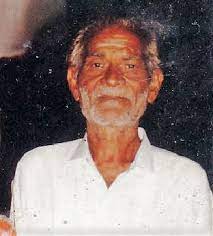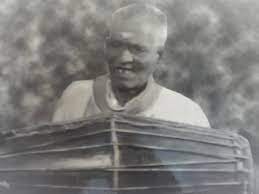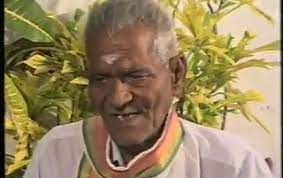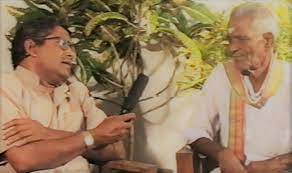K. Chellaiya Annaviyar
இந்தப் பக்கத்தை தமிழில் வாசிக்க: க. செல்லையா அண்ணாவியார்
K. Chellaiya Annaviyar was a kootthu (folk dance/ drama) artist from Eezham. Chellaiya Annaviyar was one of the very few Annavimars ( kootthu tutors) who was actively involved in traditional as well as modern kootthus. Together with universities and schools, Chellaiya Annaviyar trained people in many kootthus. He was the lieutenant of Prof. Vidyanandan in the kootthu revival activities that began in the 60s. Chellaiya Annaviyar laid the foundation for the revival of kootthu art form which ratified to Education, functional in universities in Eezham today.
Personal Life
Chellaiya Annaviyar was born at Kaluwankeni village of Vantharumoolai in Batticaloa, Sri Lanka. He was known as Vantharumoolai Chellaiya Annaviyar. The Ministry of Culture of the Eastern Province used to grant Rs. 2000/- per month to helpless veteran artists. During later days of his life, Chellaiya Annaviyar depended on this amount though this was not received regularly.
Artist Life
From a Young age, Art interested Chellaiya Annaviyar. He was interested in musical dramas. In the 1920s and 1930s, the music and drama troupes that came from India to Sri Lanka were of two types: One, Sankaradas Swamiji-styled stage dramas filled with songs, and the other, Parsi theatre-styled dramas filled with dialogue and music. Chellaiya Annaviyar was attracted to both these styles of Theatre plays which held at the Welhasim Hall in Batticaloa town and learnt stage skills through the 'Imperial theatre' troupe. At young age, Chellaiya Annaviyar enacted the roles of Sahadeva and young Pulendran by singing in the plays Alli Arjuna, Pavalakodi and Pravahan. With the advent of cinema in the 1930s, this type of musical theatrical dramas began to fade and become extinct, and Chellaiya Annaviyar turned his focus on the traditional kootthus.
At the age of 18, Chellaiya Annaviyar was attracted to the vadamodi kootthus like Pururuva Chakravarthy and Subhadra Kalyanam and became fully involved in kootthu. He was fascinated by the riveting dance, the energetic songs and the decorations found in vadamodi kootthu and became engaged in it. In his lifetime, Chellaiya Annaviyar mastered more than 20 kootthus. In the north of Batticaloa, He practiced kootthu at Thampankadawai, Muthagal, Kandakadu and Karuppalai and in Batticaloa, at Ottamavadi, Murakkatansenai, Navaladi, Morsappity, Arayampathi, Thannamunai, Periyakallaru and Puthukkudiyiruppu. Between 1947 to 1960, Chellaiya Annaviyar was engaged in the practice of full-length kootthus. After 1958, Chellaiya Annaviyar was engaged in teaching kootthu in the universities and schools. Between 1960 to 1966, Chellaiya Annaviyar taught kootthu at the University of Peradeniya under Prof. Vidhyanandan. There, Chellaiya Annaviyar first gained the experience of teaching kootthu art with women. He taught kootthu to the Tamil students at The Royal College, Colombo. Between 1972 and 1980, Chellaiya Annaviyar worked in kootthu activities along with Vinson Dhiraviam Ramachandran, deputy officer of Vinson College in Batticaloa. He staged two plays solely with women: Uthama Bharathan and Chenchotru Kadan Theertha Semmal. In dramas like Sankaaram Kootthuru etc. he was an Annaviyar of matthalam (musical instrument).
Students
- Selvaraja Annaviyar
- Naavaladi Kandhasamy
- Shanmugam Pankudaveli Baby
Awards
- In 1993, Chellaiya Annaviyar received the "Lankatilaka" award, the highest award given to a Sri Lankan artist from the President
- In 2002, Manmunai Cultural Council of Vipulananda Institute of Aesthetic Studies at Kallady, Batticaloa organized a felicitation ceremony for Chellaiya Annaviyar.
- In 2008, Chellaiya Annaviyar was awarded with "Thalaikol Virudhu" by Eastern University.
Kootthu Performances
- Karnan Poar (1960)
- Vaala Bhiman play (1969)
- Dharumaputhra play (1970)
- Subhathrai Kalyanam
- Pashupatastram
- Nondi play
- Raavanasenan
- Vaali vadhai
References
- "Nadagam - Arangiyal : Pazhaiyathum Pudhiyathum" - Professor C. Maunaguru, Kumaran Puthaga Illam, Colombo - Chennai 2021.
- Aryampathi - Murannagaiyana Oru Vazhvu - Vandharmoolai Chellaiya Annaviyar - Maunaguru
✅Finalised Page
First published on:
16-Aug-2023, 13:15:42 IST




